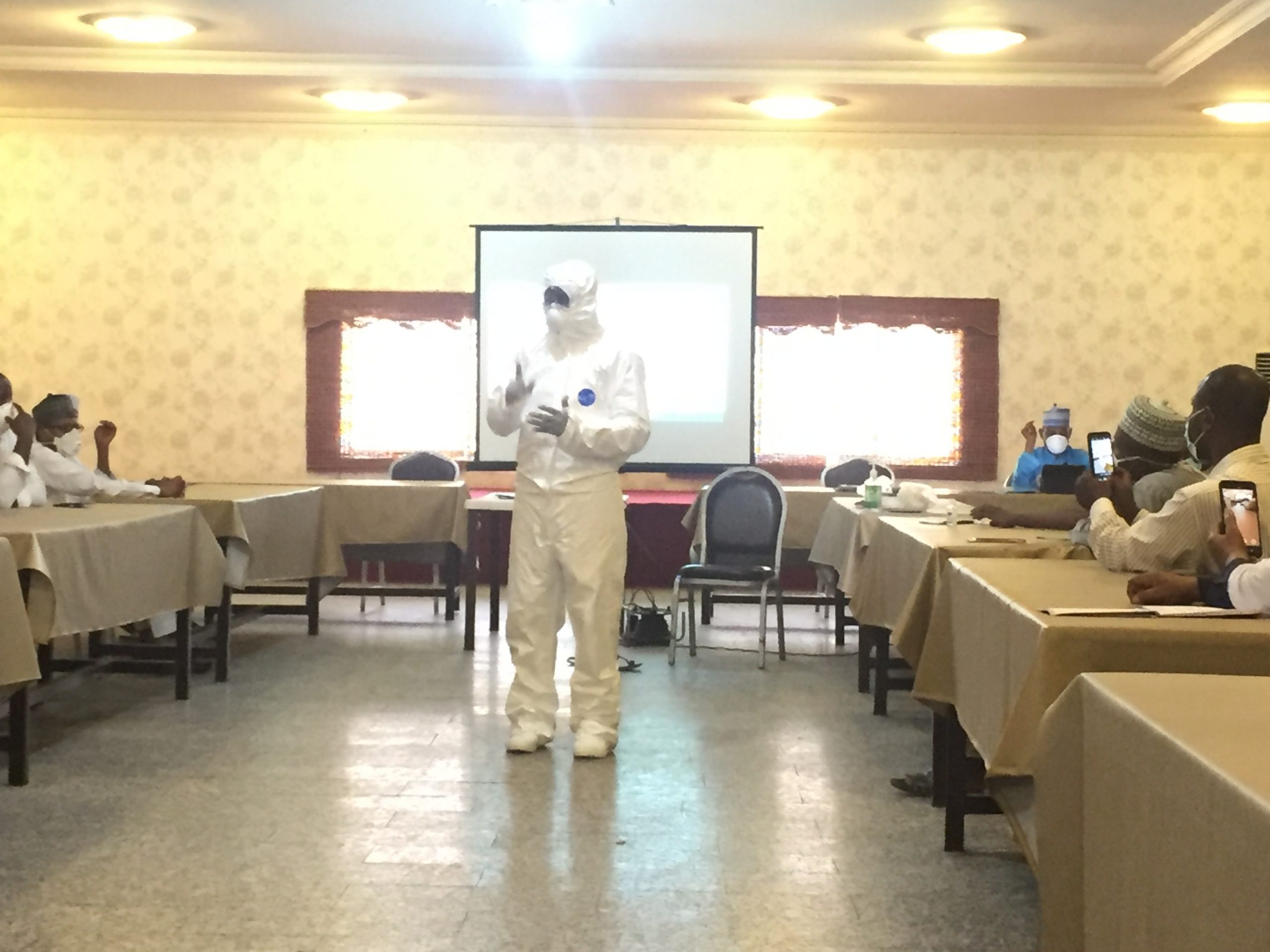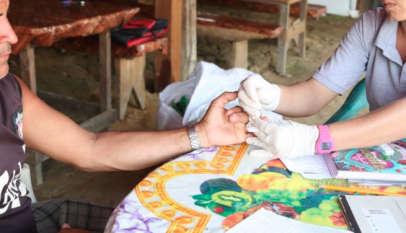How lack of protective equipment for health workers hinders Kano’s fight against COVID-19
Lack of Personal Protective Equipment (PPE) for healthcare workers in Kano remains a major bottleneck in the campaign against COVID-19 in the state

In the last few weeks, social and traditional media in Nigeria had been awash with reports of mysterious deaths within Kano metropolis. The strange deaths were initially linked to many ailments, namely: malaria, hypertension, pneumonia, and COVID-19. However, after the conclusion of its fact-finding mission on the strange Kano deaths, the presidential team sent to Kano to investigate the deaths, in its preliminary report released May 4th, had said majority of the deaths were caused by COVID-19.
The spread of the pandemic to Kano in April saw the beginning of community transmission of the virus which eventually led to the near total breakdown of the healthcare system in Kano, as a result of the closure of all private healthcare facilities, as an attempt to limit the spread of COVID-19 in the state. The breakdown of the healthcare system was caused by, amongst others, the sense of fear among unprotected healthcare workers of contracting the virus from patients who might have been infected with COVID-19.
Indeed healthcare providers at public healthcare facilities in Kano metropolis had recently been overwhelmed by the unusually high increase in numbers of patients seeking for lifesaving services. But due to lack of bed spaces and manpower, healthcare workers had to turn away most of the patients while some healthcare workers absconded from their duties for fear of contracting COVID-19 from patients due to lack of PPE. Consequently, lifesaving services such as ANC, immunisation, and facility delivery for pregnant women were negatively impacted.
Last week, 34 medical doctors in Kano were reported to have contracted the virus in the line of duty while one died from COVID-19 complications. The NMA said most of the victims were doctors working at the Aminu Kano Teaching Hospital (AKTH) and various private healthcare facilities in the state, who got infected in the line of duty, while attending to unconfirmed COVID-19 patients.
Working without PPE is suicidal – JOHESU
Dr Murtala Umar, chairman of the Joint Health Sector Unions (JOHESU) at AKTH said it had not been easy for their members responding to the pandemic without adequate PPE adding that some of their members had threatened to stop working if they were not provided with PPE but the leadership of the Union had to persuade them against doing so by securing some PPE for them with their lean resources.
“It has not been easy for our members who are not really worried about themselves but members of their families; getting infected in the line of duty is normal for health workers, however, transmitting the infection to members of one’s family is the greatest challenge. Consequently, some of our members had wanted to down tools due to lack of PPE; we had to persuade and calmed them down. Some have decided to stay at home because they feel if they are not being adequately protected they would end up getting infected; I don’t blame them,” he told African Newspage.
Dr Umar wondered why despite the so many donations being made to the government, by Nigerian billionaire businessmen such as Aliko Dangote, Femi Otedola and Abdulsamad Rabiu, they were yet to begin receiving PPE support from the Presidential Task Force on COVID-19 (PTFCOVID-19).
“Working without PPE is suicidal hence our professional maxim is: ‘Protect yourself first before you save a patient.’ So, I don’t blame healthcare workers who refuse to work without adequate protection. We are therefore appealing to the Nigerian government to make the PPE available to us. We have been hearing of donations from the Dangotes, Otedolas and Alakijas of this country and wonder why we are yet to begin receiving PPE donations even though Kano is one of the epicenters for the pandemic in Nigeria,” he said.
“I got infected with COVID-19 due to lack of PPE” – AKTH nurse
A nurse working at the accident and emergency unit of AKTH who spoke to African Newspage anonymously, said he got infected with COVID-19 over three weeks ago, after managing a COVID-19 patient whose relatives had provided them with a wrong medical history but whom he said showed obvious COVID-19 symptoms. The patient, who was brought to AKTH in critical condition died the next day and was later confirmed to have been COVID-19 positive.
“When the patient was brought to us I suspected she was infected with COVID-19 even though her relatives gave me a wrong medical history. I became suspicious when I realized all of her seven relatives were wearing the N97 mask, which is meant for medical workers. My suspicion got heightened when, in the dead of the night, the relatives went home to bring a complete oxygen system for her own use. It was then I realized they knew she was COVID-19 positive and they had been managing her at home before they eventually brought her to us,” the nurse said.
“The universal practice in periods like this is to treat all patients as suspected of being positive; I got infected because I wasn’t properly protected when I attended to her. We don’t have adequate PPE; the ones we have been using until now were supplied to us during the Ebola crisis of 2014-2015, so they might have even expired. We are yet to receive new ones; the limited ones we have were procured to us by the management of the hospital whose revenues are limited and have dwindled due to this pandemic. And you know most of the PPE are disposable which means you can’t use them more than once.”
While responding to the allegation that health workers at AKTH were turning away patients, the nurse said although they had to turn away many patients in recent times, it was not out of discrimination or fear of being infected with COVID-19; instead, he said it was because they were simply overwhelmed by the increasing number of patients they were receiving for whom they lacked adequate bed spaces.
“We have been having unusually high patients’ turnout in recent weeks which is because of our position as the only tertiary healthcare institution in Kano and the closing down of private hospitals in Kano metropolis. Subsequently, we were receiving more than double the usual number of patients we received before now, and since we do not have enough bed spaces to accommodate all the patients, we naturally couldn’t admit them. Unfortunately, the patients do not understand our predicament and would conclude we are turning them away.”
No PPE, no work – NMA
Dr Sanusi Bala, the chairman of the Kano state chapter of the Nigerian Medical Association (NMA) said only 1 or 2 healthcare facilities in Kano had adequate supply of PPE and few more had them in limited supply while majority lacked any PPE at all. He however said although lack of PPE was one of the major causes of their members getting infected with COVID-19, lack of training on triaging and management of suspected COVID-19 patients was another major factor.
“The training of Kano health workers on managing suspected COVID-19 patients only commenced two weeks ago. So, most of those working in our hospitals found themselves treating patients who eventually tested positive for COVID-19 without protection; this exposed them to the risk of contracting the virus. The major problem is lack of Infection Prevention Committees (IPCs) in most of the hospitals, consequently, health workers were mishandling patients and getting infected in the process,” he told African Newspage.
Dr Bala said to protect more of their members from getting infected with COVID-19 while treating suspected or confirmed cases of the disease, the NMA had issued a standing order to all its members working in high risk areas asking them not to work if they didn’t have adequate protection until they were provided with PPE.
Preparing health workers for COVID-19
It was against this backdrop that the Kano state taskforce on COVID-19, as part of its strategy for responding to COVID-19 in Kano, two weeks ago, commenced a series of capacity building trainings for healthcare providers in the state, on how to protect themselves against being infected with COVID-19. The training which is being conducted in accordance with established guidelines of the Nigeria Centre for Disease Control (NCDC) is also meant to equip the healthcare providers with requisite skills to also protect patients seeking essential healthcare services in their facilities.
Dr Yusuf Sabo, lead for the Infection Prevention and Control (IPC) pillar of the Kano COVID-19 taskforce, said they would ensure all healthcare facilities in Kano had functional and efficient Infection Prevention Committees (IPCs) so as to reduce workers’ and patients’ exposure to the transmission of COVID-19. He said his pillar would ensure proper monitoring of the trained providers so as to establish or revive hitherto dormant IPCs across healthcare facilities in the state.
“The idea is to ensure that every patient who goes to a healthcare facility gets the needed services being rendered. And if patients show symptoms that are suggestive of COVID-19 infection, the facilities will isolate the patients while they call the surveillance team to collect their samples. If the patient eventually proves to be positive, they would be linked up with the isolation team; if otherwise, the patient will be managed within the same facility,” said Dayyabu Yusuf, state team lead for UK Department for International Development’s Lafiya programme, which supports the trainings.
Consequently, the health workers who were drawn from secondary, primary, as well as private healthcare facilities in Kano state were trained on a wide-range of issues from establishment of IPCs, triaging, practical usage of PPE such as gowns, boots and goggles to isolation and management of suspected COVID-19 patients. The capacity building trainings seek to revive Kano healthcare providers’ confidence in their ability to not only protect themselves but also protect their patients across public and private healthcare facilities in the state, during the pandemic.
Ahmed Ghazali, a nurse at the Sir Muhammadu Sanusi Specialist Hospital in Kano metropolis who participated in the training said he acquired a better understanding of the disease, how to protect himself against it as well as manage suspected COVID-19 patients. “I now understand how to protect myself and my patients including how to use PPE and dispose of them, accordingly. I have also learnt not to discriminate against patients anymore. However, we are calling on the government to provide us with adequate PPE so we can give the efforts to respond to the pandemic our best,” he said.
By building healthcare providers’ capacity to safely deal with sick people including potential COVID-19 patients in healthcare facilities, a unified healthcare system could be achieved in Kano state. This will ensure easier management of all COVID-19 cases by ensuring smooth identification of positive cases through sample collection and testing by the Rapid Response Team (RRT) which will help stem the current chain of community transmission in the state.
However, without providing adequate PPE such as goggles, face-shield, face masks, gloves, gowns and rubber boots for frontline healthcare workers, the skills they had acquired would remain unusable. Consequently, federal and state governments must ensure adequate supply of all necessary PPE to all frontline healthcare workers in the state so as to protect them from getting infected while treating patients. Equally important is the provision of substantial hazard allowance to health workers working on the frontline, on the basis of the level of their personal risks.
This story was facilitated by the Wole Soyinka Centre for Investigative Journalism (WSCIJ) under its COVID-19 Reality Check project.










